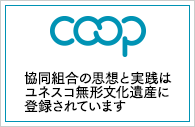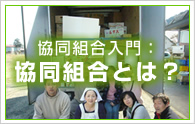Cooperators gather to celebrate 2019 International Day of Cooperatives
-Tokyo Japan, on Tuesday, July 9th, 2019-
The Central Assembly to celebrate the International Day of Cooperatives was held on Tuesday, July 9th, 2019 at the Asahi Hall in Yurakucho, Tokyo, which was co-hosted by the Japan Cooperative Alliance (JCA) and Cooperatives Japan (the National Council to Commemorate IYC 2012). The assembly gathered 450 participants including cooperators fromnational cooperative organizations and the media.
The International Day of Cooperatives has been celebrated annually on the first Saturday of July since 1923. The aim of this celebration is to increase awareness of cooperatives, which contribute to resolving major social, economic, and environmental problems around the world, and to strengthen partnership between the cooperative movement and other actors.
The theme of the 2019 International Day of Cooperatives is “COOPS 4 DECENT WORK". It has been chosen to support Sustainable Development Goal (SDG) 8, “Promote sustained, inclusive and sustainable economic growth, full and productive employment and decent work for all”. The theme with a special focus on the future of work also coincides with the centenary of the International Labour Organization (ILO) that the ICA has long been cooperating with.
The Central Assembly was kicked off with an opening address by Toru Nakaya, President of the JCA and Chairperson of Cooperative Japan, who is also President of JA Zenchu (the Central Union of Agricultural Cooperatives) , followed by congratulatory video messages by Ariel Guarco, President of the ICA, and Guy Ryder, Director General of the ILO.
Masako Taguchi, Director of the ILO office for Japan, made a keynote speech on “Decent work and cooperatives”, mentioning the history of the ILO, decent work that the ILO aims to achieve and close relationship between the ILO and the cooperative movement in Japan and worldwide. She stressed that the ILO and cooperatives were partners to achieve decent work and hoped to further strengthen cooperation.
Mayumi Oka, Specially-Appointed Associate Professor at the Institute of Statistical Mathematics, Research Center for Medical and Health Data Science, made a commemorative speech on “A thought about livable communities – from a survey of a town with the lowest ratio to commit suicides”. She had made a field survey and data analysis for 4 years in a town called Kaifucho, in Tokushima prefecture, with the lowest ratio to commit suicides in Japan. She has found out that there are the following 5 factors that may contribute to preventing committing suicides:
- Not-too-close (loose) human relationship,
- Give importance to diversity,
- Judge a person from many sides and in the long term,
- Foster self-efficacy, and
- Encourage people to send an SOS call at an early stage.
She concluded that such features of a livable town might give us a hint of how a group of people should be in local communities, workplace, schools, and social media. Her speech gave the participants a number of suggestions how cooperatives should work to achieve decent work. .
Taking into account the two presentations, a panel discussion was held with panelists from various cooperative representatives.
Kenji Fukuda, Deputy Manager of the Okazaki Branch Center of the Aichi Consumer Cooperative, referred to a social welfare activity using a closed elementary school. The activity was conducted by the consumer cooperative and its member residents. He said, “Decent work is something that cooperative workers and members create together based on the local community.” He stressed that such experience helped cooperative members and workers regain confidence in the value of their cooperative that was committed to the local community.
Yoko Ikeda, CEO of JA Azumi Mutual Help Network “Anshin”, a specified non-profit juridical person, mentioned its various activities such as “Iki-iki School”, a place where agricultural cooperative members and local residents study issues of interests voluntarily and freely, aiming to “create a safe and livable hometown where people can continue to live in their community and their own homes” and to realize everyone’s “wish to live lively”.
Fumie Kobayashi, Manager, and Nobuko Aoki, Deputy Manager, of the Matsudo Local Welfare Base of the Central Worker Cooperative, spoke about their activity of building a workplace and a community through “cooperative work” where handicapped, elders, NEETs (people Not in Education, Employment, or Training) and former “Hikikomoris” (people who have secluded themselves from the society) get together and work actively, each person having his/her own role, utilizing her/his specialty, and respecting each other.
The panel discussion was coordinated by Natsuko Tanaka, President of the Japanese Society for Cooperative Studies. Akiko Taguchi and Mayumi Oka also joined the discussion as commentators. They reiterated that all the activities reported aimed to achieve decent work and contributed to creating motivation in life and livable communities. The discussion was concluded by reconfirming that it is important for cooperatives to realize a sustainable society with local residents through decent work.
Prior to the closing, Toshiyuki Nagashima, Executive Director, and Megumi Morisaki, Member, of the Japan Actors Union, an SME cooperative with 2,700 member actors/actresses and one of the new JCA member organizations, made presentations, pledging to collaborate with other JCA member cooperatives and work hard to achieve decent work in the art and culture sector.
Lastly, Eiichi Honda, Vice President of the JCA and Vice Chairperson of Cooperatives Japan, who is also President of the Japanese Consumers’ Cooperative Union made a closing address, through which the participants reconfirmed that “cooperatives must work together, sharing their achievements and recognizing roles and expectations for cooperatives, in order to realize decent work that is indispensable for a fair, sustainable and prosperous society”.
Mr. Honda announced that Cooperatives Japan, which was created to commemorate IYC 2012, would finish its role today on July 9th and JCA would take over all its activities on July 10th. He also announced an establishment of the “Cooperative Forum” on July 10th as a forum where leaders from different cooperative sectors can get together and exchange views, based on the relationship fostered by Cooperatives Japan.











